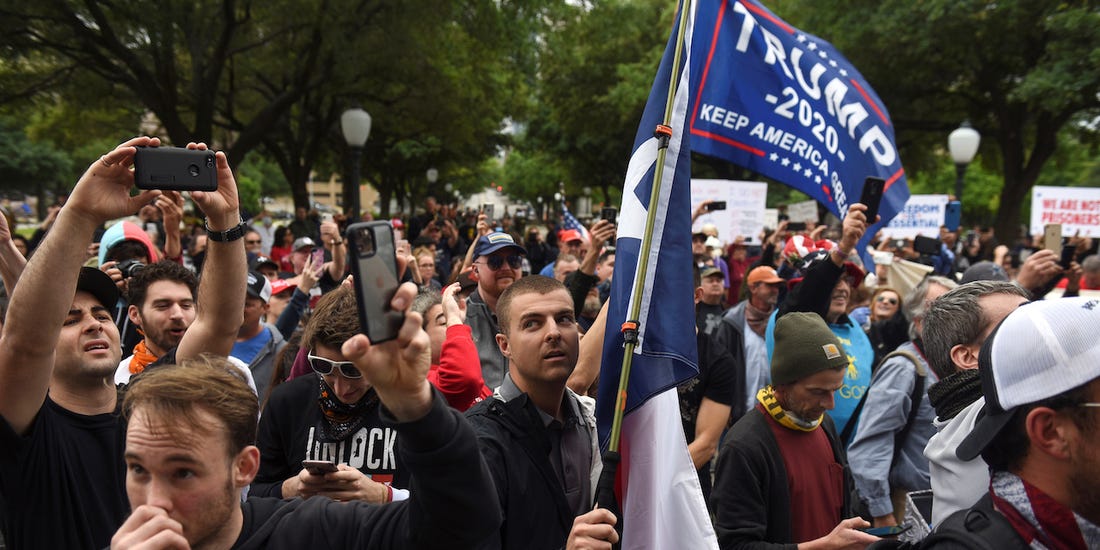COVID-19 another stage for US partisanship to play out
https://arab.news/8533r

As the US responds to the coronavirus disease (COVID-19) outbreak, partisan identities that predate the virus are shaping many Americans’ views of the threat it poses, the mitigation measures, and the impact on the economy. Partisan identities are shaping everything from opinions of President Donald Trump’s handling of the crisis to whether to wear a face mask. However, there are some areas of bipartisan agreement and some nuance within an otherwise deeply divided American public.
The most controversial issue right now is over when and how to ease restrictions — such as business and school closures and social distancing — in the hope of restarting the economy. Recent protests in some states calling for an end to restrictions have provided high-profile examples of differences on this issue. These protests have been very partisan in nature. Many of the participants, organizers and funders are conservative Republicans who also protest on other partisan issues. Many of the protesters expressed pro-Trump sentiments, and the president tweeted support for them. He even encouraged protesters to “LIBERATE VIRGINIA,” as well as a couple of other states with Democratic governors.
While the protesters are only a minority of Americans, they are an extreme variation of a partisan reality throughout the country, which is shaping attitudes and policies toward the COVID-19 response. A poll by the Pew Research Center this month found that 81 percent of Democrats and independents who tend to vote Democratic are more concerned that state governments will ease restrictions too soon rather than too late. This and other polls suggest there is very strong support among Democrats for closures, social distancing and other mitigation measures. Republicans, however, are divided, with a narrow majority — 51 percent — concerned about opening up the economy too soon, with 48 percent more worried about not lifting restrictions quickly enough, according to Pew. Public attitudes have an impact on policy. Currently, several US states are moving to lift restrictions, and most of those moving quickly to end closures have Republican governors.
Partisan identities are driving Americans’ reactions to the pandemic in other ways, too. A March poll from Pew found that Republicans were somewhat more likely to believe that Americans are overreacting to the pandemic than underreacting (39 percent to 31 percent). The reverse was true with Democrats, with 48 percent of Democrats expressing concern that Americans were not taking the virus seriously enough, with only 25 percent saying people were overreacting. A recent Washington Post-University of Maryland poll found that 77 percent of Democrats and those leaning Democratic believed that public gatherings will not be safe until the end of June or later, with only 51 percent of Republicans saying the same. The same poll and other surveys suggest that Democrats are more likely than Republicans to wear masks.
Unsurprisingly, there are huge gaps in how Republicans and Democrats view Trump’s response to the pandemic. A FiveThirtyEight analysis of multiple polls found that 85 percent of Republicans approved of Trump’s handling of the pandemic, while only 16 percent of Democrats agreed.
However, there are important areas of agreement. A Pew poll last month found that large majorities of Democrats and Republicans supported closing schools. An April Pew poll found that 89 percent of both Republicans and Democrats supported the economic aid package that Congress passed in March. Both groups tend to view public health officials favorably. Majorities of both Democrats and Republicans think that the economic problems caused by the pandemic will last longer than six months, though Democrats are particularly likely to share that view.
Even among Republicans, there are important nuances in attitudes. One poll found that Republicans who worry that they could become seriously ill are more likely to support social distancing and other restrictions. Another poll found that moderate Republicans are more likely than conservative Republicans to support measures designed to contain the virus’s spread. Among Republican governors, there are important differences between those who are trying to very quickly lift restrictions and those who are taking a more cautious and phased approach. While Republicans are less likely to wear masks than Democrats, many still do.
Partisan differences are having an immediate impact on policy and practice in combating the pandemic.
Kerry Boyd Anderson
Multiple factors drive the gap in partisan attitudes toward COVID-19, including ideological principles, the differences between urban and rural experiences with the pandemic, and negative partisanship, which can lead people to take the opposite view of the other political “tribe.” Another key factor is which sources of information people trust. Republicans are more likely to trust Fox News and the White House, which have tended to focus on the economic impacts and, at times, have downplayed the public health threat. Democrats are more likely to trust a range of media sources that have tended to emphasize the public health concerns. While all of these sources have covered both economic and public health issues, the emphasis has been different and has played a role in shaping public attitudes.
COVID-19 has become yet another stage for US partisanship to play out. Partisan differences are having an immediate impact on policy and practice in combating the pandemic. They will have an impact on the presidential election in November. More broadly, the interplay of increasing partisanship and COVID-19 is unfortunately likely to further divide Americans. While the shared experience of enduring a pandemic might still help to bring Americans together, it is at least as likely that Americans will view the trauma through a partisan lens, blaming the other side’s political leaders and media — and even blaming each other — for the human and economic losses.
- Kerry Boyd Anderson is a writer and political risk consultant with more than 16 years’ experience as a professional analyst of international security issues and Middle East political and business risk. Her previous positions include deputy director for advisory with Oxford Analytica and managing editor of Arms Control Today. Twitter: @KBAresearch









































